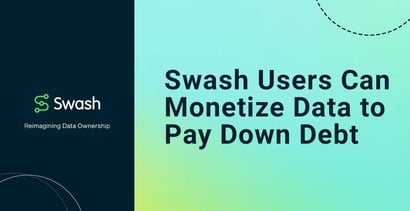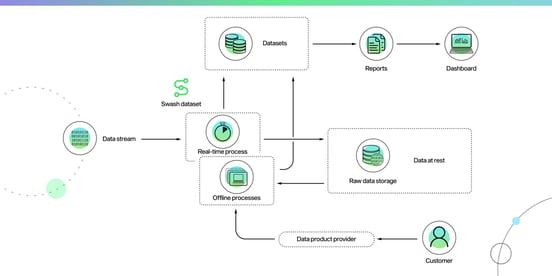

In a Nutshell: Earning revenue from data has historically been exclusive to tech giants. Swash wants to change that dynamic by empowering users to earn income from their daily digital activities. The platform accomplishes that through an unobtrusive web plugin that collects user data. When third parties purchase that data from Swash, users can earn a portion of the proceeds to boost their income or pay down debt. The amount they can earn depends on how much of their data they want to sell, and they control their information at all times.
Over past decades, advances in technology have provided massive leaps in utility and convenience, including computers, smartphones, and smart homes. But they have also created a thriving ecosystem of data. And that data is worth a lot of money.
For example, many people use online platforms for web searches, word processing, and document sharing. Those companies may earn some revenue on premium versions of their services, but data is more important. People sign off to allow the information they enter to be processed, packaged, and sold.
The same is true of many social media platforms and tech companies. But the person generating all that data sees little to no return on the information they provide.

Swash aims to change that dynamic. The plugin gives consumers more control of their data and allows them to earn revenue when they consent to allow third parties to purchase it.
“Swash actually started as a technical experiment in late 2019,” said Chloe Diamond, Chief Marketing Officer at Swash. “Our CTO saw what streamer teams were trying to do and decided to build an application on top of it. And it grew organically, like people got very excited about it.”
Swash users can earn money from the data they generate, and they can do it while safeguarding their privacy. In addition, the plugin allows them to collect revenue from daily digital activities, which can add up. And savvy consumers can use that extra income to pay off debt, build savings, and gain even more financial flexibility.
An Intuitive and Unobtrusive Plugin That Protects Privacy
Swash offers a browser plugin that runs in the background. The development team designed it to be as lightweight and unobtrusive as possible to avoid taxing the user’s hardware and patience.
“We find that suits a lot of people,” Diamond said. “If you’re using Google Chrome, for example, people just have to install the plugin, and they can continue as they were.”
Users report that Swash provides a friendly experience, and it doesn’t slow down their browsing or interfere with their everyday habits.

Swash also lays the foundation for other applications that allow users to generate more revenue to pay off debt.
“For example, if you’ve installed the flash browser extension, then maybe you’ll receive a pop-up saying ‘This advertiser wants you to fill in a poll, and you can earn money, would you like to participate in this?’” Diamond said. “Then, by filling in polls or surveys, you can earn even more.”
Users can opt in or out of those opportunities, and if they want to receive notifications, they can choose to do so in the application settings. If they prefer not to be bothered, they can easily toggle the option off, and continue earning through the Swash plugin.
“We’ll make it so that people can adjust the settings,” Diamond said. “Maybe some people don’t want to be bothered at all, ever. Others want to opt in to everything and get as much as they can. It’s about bringing more options to people, but not in a way that they’re going to be burdened by it as well.”
Consumers Can Earn Cash From Their Data Each Month
How much users earn with Swash depends on multiple factors. Currently, users receive payments from Swash to incentivize usage. In the future, revenue will be a function of the individual and the circumstances, and it also depends on which business purchases the data. That could allow consumers to pay off debt even faster.
“Until now, we haven’t sold the data to a data buyer, just because they want to have a bigger panel size,” Diamond said. “We’ve received a lot of interest. And they say, “When there’s a certain amount of people in this geography, we want to purchase the data.”
Swash’s research indicates that individual data could be worth between $10 and $2,000 per month. A small family could earn up to $24,000 per year — which could be used to pay down debt quickly.

And those may be conservative estimates. Diamond said the European Commission put the current data economy’s value at $3 trillion, which means people have opportunities to earn income from their online routines.
Diamond also noted that 80% of that data hasn’t even been tapped yet, and the amount available is growing rapidly. As technology continues to develop, data will become even more abundant and accessible. And users will want to see financial gains from the information they generate.
“It’s quite difficult to imagine how that will evolve,” Diamond said. “I’m glad to be part of this movement where people are deliberately evolving it in a direction where it’s not exacerbating problems of the likes of Google, Facebook, and others. It’s very exciting.”
Allowing Users to Maintain Control of Their Information
Users may be concerned about the security of their information since Swash collects and distributes their data to buyers. But data monetization doesn’t mean users need to give up their privacy.
Swash works closely with a privacy technologist who is familiar with data security evolution. He helps Swash avoid mistakes that have made personal data and privacy exploitable in the past.
Swash doesn’t collect any personal data, including names, phone numbers, or credit card numbers. The only way users are identified alongside data is through their public address, and Swash only uses that information to distribute their earnings.
Users can also mask certain words and terms, and Swash won’t collect and sell data related to those terms.
“For example, you don’t want Swash ever to collect when you search for cats,” Diamond said. “So you can just put the word cats, and it will completely ignore it.”
Swash uses blockchain technology to distribute its SWASH Tokens as rewards, which automatically encrypts all the data it records from end to end. In addition to providing a strong privacy safeguard, the technology’s architecture prevents data from being tampered with in the unlikely event of a breach.
Besides its technical safeguards, Swash has also undergone a data protection authority (DPA) assessment with the UK Information Commissioner’s Office. That ensures Swash is fully compliant with data protection standards, including GDPR.
“From a legislation point of view, we’re all set,” Diamond said.
Swash: Moving Toward a Universal Data Ecosystem
Swash doesn’t see the browser plugin as its final form. Its goal is to create a universal data ecosystem that prioritizes user benefits and well-being. Swash has received plenty of feedback and conducted extensive research in pursuit of that goal.
“We take the principles of everything we’ve put into practice with the browser extension and work in a more collaborative way,” Diamond said.
The core of Swash’s ethos is working in collaboration, rather than in competition, with other entities and organizations. In the future, Swash will release more products and services built on top of its existing technology. As a result, its ecosystem will provide a more streamlined experience for businesses and developers.
Swash provides a general overview of its plans in a blog post titled The Dawn of a New Age of Data. The post offers an idea of the data ecosystem and how it will differ from the current standards surrounding online data usage.
Even as it sets its sights higher, Swash remains focused on its users. User data will drive the new ecosystem, and Swash is committed to providing the best possible experience.
Advertiser Disclosure
BadCredit.org is a free online resource that offers valuable content and comparison services to users. To keep this resource 100% free for users, we receive advertising compensation from the financial products listed on this page. Along with key review factors, this compensation may impact how and where products appear on the page (including, for example, the order in which they appear). BadCredit.org does not include listings for all financial products.
Our Editorial Review Policy
Our site is committed to publishing independent, accurate content guided by strict editorial guidelines. Before articles and reviews are published on our site, they undergo a thorough review process performed by a team of independent editors and subject-matter experts to ensure the content’s accuracy, timeliness, and impartiality. Our editorial team is separate and independent of our site’s advertisers, and the opinions they express on our site are their own. To read more about our team members and their editorial backgrounds, please visit our site’s About page.




